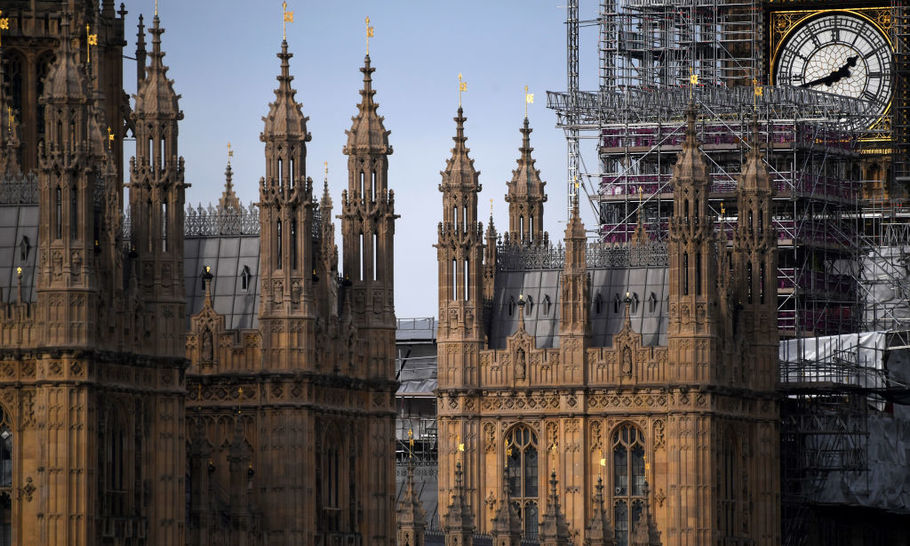This Battle of Britain Day, let’s resolve to debate Europe more charitably

(Photo credit should read CHRIS J RATCLIFFE/AFP via Getty Images)
The British have always taken pride in the quality of our parliamentary debate. And this pride has indeed often been justified, especially at moments of supreme danger. Eighty years ago today, the Battle of Britain reached its climax, when the Luftwaffe sent a huge fleet of 500 bombers and 620 fighters to attack London. RAF Fighter Command sent every Spitfire and Hurricane into the air to defend the capital, some 630 fighters in all. In the face of such resistance, the Nazi onslaught utterly failed to inflict serious damage on the city. By the end of the day, the Germans had lost about 60 aircraft, the British just 29. As a result of this defeat, Hitler called off his planned invasion, Operation Sealion. The Luftwaffe scaled down its daylight assaults and switched to the nighttime bombing raids known as the Blitz.
We all remember Winston Churchill’s speeches during the Battle of Britain. The most famous of them, on August 20th, includes the unforgettable sentence: “Never in the field of human conflict was so much owed by so many to so few.” Churchill believed that “the gratitude of every home in our Island, in our Empire, and indeed throughout the world, except in the abodes of the guilty, goes out to the British airmen”. He was right then; would that it were so today.
The level of debate on Monday at the first reading of the UK Internal Market Bill, however, was a disgrace to the House of Commons. Personal invective against the Prime Minister dominated many of the interventions of the Opposition. Hysteria reigned about the Government’s hypothetical threat to break international law. Boris Johnson responded by calling on the EU to “take its revolver off the table” in the present trade negotiations. This was not the finest hour of British politics.
Those who read Churchill’s speech about “the Few” may be surprised to learn that much of it is about food. He warned the country to expect a blockade by the Germans and he felt the need to explain at length why it was necessary to blockade Occupied Europe in return. He promised that food would be provided for the “enslaved” population as soon as they were liberated. He did this because the starvation that occurred on the Continent during and after the First World War was still fresh in people’s minds. And there were indeed famines at the end of the Second World War, too, especially in Germany itself. Though food was still strictly rationed in Britain, supplies were sent to feed the Germans during the winter of 1945-46.
This is worth recalling, because the issue at stake in the Internal Market Bill is the prevention of a possible interruption of food supplies from Britain to Northern Ireland. If it is true that the Commission’s negotiatiors, led by Michel Barnier, have hinted at using the EU protocol in the Withdrawal Agreement to stop food and other goods being traded freely within the UK, then the danger of serious shortages in Northern Ireland after the end of this year is a real one. We have recently been reminded what it feels like to have empty supermarket shelves and emergency food parcels delivered to those in need. Nobody with a shred of decency would threaten the people of the Province with such an artificial blockade, knowing that the mere threat would be sufficient to cause panic buying and severe hardship.
It is the duty of any British Government to take every possible measure to ensure that such a blockade across the Irish Sea could never occur. It would not even be constitutional for the EU to attempt to impose tariff barriers between Northern Ireland and the rest of the UK. The Act of Union 1800, which created the United Kingdom, explicitly prohibits such internal barriers to trade. That is why the Internal Market Bill contains the contentious clauses on Northern Ireland that have precipitated the Tory rebellion and caused several former Prime Ministers to criticise the present incumbent of No 10.
It is worth observing that the German Constitutional Court has always held that the integrity of the Grundgesetz, the Basic Law that has been the constitution of the Federal Republic since 1949, takes precedence over any European treaty or law. That is the same jurisprudential doctrine that informs the UK Internal Market Bill. What is good enough for the Germans should be good enough for the British, too. Is it conceivable that France, say, would allow the EU to interrupt trade with Corsica, or any other province of Metropolitan France? Of course not.
It is highly unlikely that the clauses that would allow the British Government to override the Withdrawal Agreement will ever be invoked. The arbitration process that was built into the Agreement was designed to resolve any disputes about trade, state aid or other issues concerning the Irish border. But just as the EU jealously guards its own internal market, so it should respect the similar desire of the UK. The only reason why the British have so far been largely indifferent to the present row is that we take our internal market for granted. It has, after all, existed for more than two centuries, compared to the few decades since a British Prime Minister, Margaret Thatcher, proposed that the EU create a similar free market of its own. Now that the UK is no longer a member of the EU, we ought to be more conscious of the blessings of free trade, especially within our own islands. It isn’t only charity that starts at home. In debating these emotional issues, however, each side should at least try to be charitable to the other.





